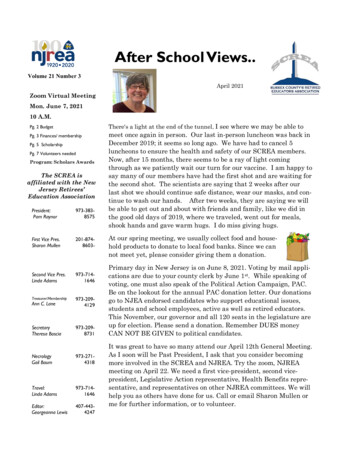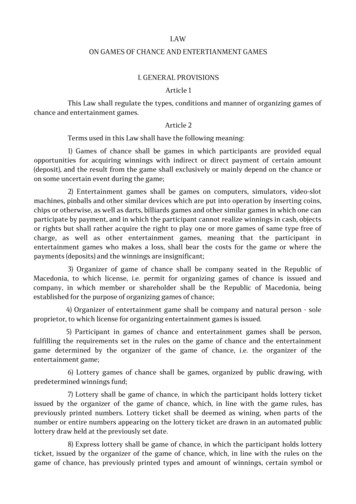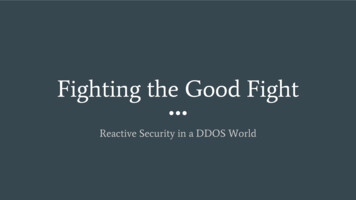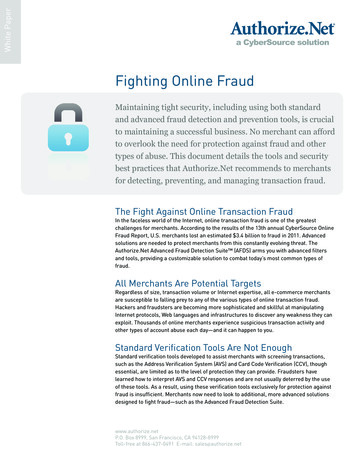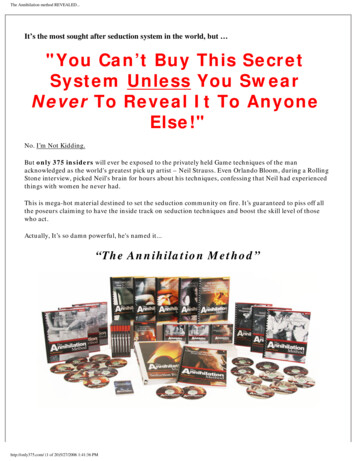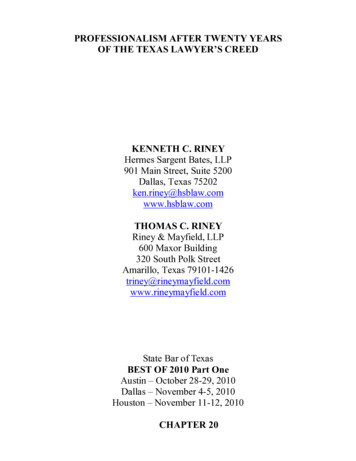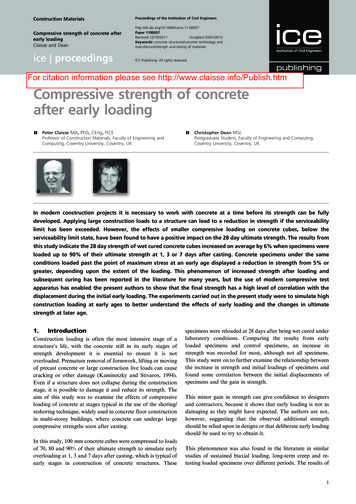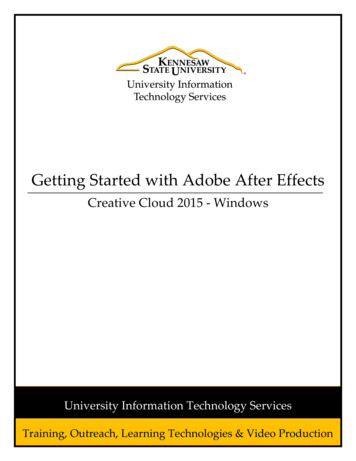
Transcription
FIGHTING CHEATERS IN GAMES AFTERBLIZZARD V. BOSSLAND: THE HISTORYAND FUTURE OF ANTI-CHEATSLITIGATIONTianyue Zhang I.II.III.IV.V.TABLE OF CONTENTSIntroduction . 242Background . 243A. What Are Cheats and Why Are They Bad? . 243B. Traditional Anti-Cheating Effort . 245C. Litigation Has Been Difficult . 2471. Every Difficulty a Plaintiff Can Have . 2472. Slow Development of Case Law . 248Analysis . 248A. The Legal Arguments and Status Before Blizzard v. Bossland . 2481. Tortious Interference with Contractual Relations. 2482. The Digital Millennium Copyright Act (DMCA) . 2503. Copyright Infringement . 252B. World of Warcraft I: Bots Under EU Copyright Law . 253C. World of Warcraft II: Blizzard’s Victory Under UnfairCompetition . 255D. Blizzard Entm’t, Inc. v. Bossland GmbH: Jurisdiction Settled . 256E. The Future of Cheats Industry . 257Recommendation . 259A. Player Education as the Primary Objective . 259B. Working Towards Uniform Solutions to Cheating . 262Conclusion . 263 J.D., University of Illinois College of Law, December 2019. A special thank you to Professor Paul J.Heald for his critical feedback and comments, to Professor Kozo Yabe for his guidance in international law, andto all JLTP editors, members, and staff for their contributions to this Note. I would also like to thank my familyand friends for their continued support.241
242JOURNAL OF LAW, TECHNOLOGY & POLICYI.[Vol. 2019INTRODUCTIONThe computer game industry has seen a rapid growth with advancementsin computer and network technologies that allow large numbers of players tointeract instantaneously online.1 The hottest multiplayer online game in 2017was arguably PlayerUnknown’s Battlegrounds (PUBG), a shooting game thathas reached thirty million sales worldwide.2 A player of this game, however,would easily be familiarized with its dark side: cheaters.3 In the eight monthssince the game’s launch, the game developer Bluehole banned 700,000 accountsthat had used cheating programs,4 and the number is growing at 13,000 accountsper day.5 Cheating programs, or cheats, are third-party programs unauthorizedby the game developer, with the purpose of aiding a player’s gameplay inotherwise impossible manners.6 Their functions are highly various dependingon the game mechanics.7 In a shooting game like PUBG, some commonfunctions of cheats include allowing a player to see through walls to identifyother players, and aiming a gun automatically at others’ heads.8 Having suchadvantages usually means instant wins, unless other players use cheats as well.9Throughout the history of computer games, cheating has been a threat tovirtually every single game by destroying the game experience of players whocompete with the cheaters in games, especially multiplayer games where themental reward is high to dominate other players.10 Use of cheats has, of course,long been prohibited by game developers.11 However, cheating still existswidely and rampantly in computer games, and the fight between gamedevelopers and cheats is sure to continue as long as there are players who findpleasure in taking unfair advantages over others.12Many game developers have pursued litigation as an option to excludethose unauthorized third-party programs from their games.13 In most cases, thecheats developer—usually a software company—is sued for monetary damages1. See The Best Multiplayer Games on PC, PCGAMESN, https://www.pcgamesn.com/best-multiplayergames (last updated Feb. 18, 2019) (discussing some of the most popular online multiplayer games).2. Ali Jones, PUBG Celebrates 50 Million Sold with its First Ever Steam Sale, PCGAMESN (June 19,2018), nds/battlegrounds-sales-numbers.3. See PlayerUnknown’s Battlegrounds, STEAM, NOWNS BATTLEGROUNDS (last visited Mar. 28, 2019) (displaying negativecomments and votes from players about in-game cheating).4. How Crazy Are “PUBG” Cheats?, BEIJING NEWS (Nov. 27, 2017), http://mp.weixin.qq.com/s/AnyqgB iING6ak3Uedgimw.5. Rob Thubron, Up to 13,000 Cheaters Are Being Banned from PUBG Every Day, TECHSPOT (Oct. 16,2017, 8:11 AM), ers-banned-pubg-every-day.html.6. How Crazy Are “PUBG” Cheats?, supra note 4.7. Steamworks Development, Anti-Cheat for Multiplayer Games, YOUTUBE (Nov. 3, 2016),https://www.youtube.com/watch?v hI7V60r7Jco.8. See How Crazy Are “PUBG” Cheats?, supra note 4 (discussing many types of cheats with variousfunctions).9. How Crazy Are “PUBG” Cheats?, supra note 4.10. Steamworks Development, supra note 7.11. See, e.g., BGH Oct. 6, 2016, I ZR 25/15 (citing Blizzard games’ EULAs that prohibited cheats, bots,and hacks).12. See Steamworks Development, supra note 7 (introducing the incentives for a player to cheat).13. See Riot Games, Inc. v. Stefan Delgado Argote, No. 2:16-cv-5871-RSWL-AJW (C.D. Cal. Mar. 2,2017) (providing an example other than Blizzard).
No. 1]ANTI-CHEATS LITIGATION243and injunction against selling the cheats.14 One of the major battles in court hasbeen between Blizzard Entertainment, a U.S. game developer well known for itsonline multiplayer games including World of Warcraft, and Bossland GmbH, aGermany-based software company specialized in developing cheats for Blizzardgames.15 With both parties being the leader in respective industries, the longstruggle is finally coming to an end, as German and U.S. courts published severalopinions in favor of Blizzard in late 2016 and early 2017.16 Following thejudgments, Bossland has terminated the sale of the accused products andservices on its website.17This Note will examine how the litigation between Blizzard and Bosslandwould advance the law and affect the game and cheats industry, and whatstrategy in terms of both law and technology would be best for the gamedevelopers to fight cheating in the future. Part II will give an overview of theconflict and struggle between the game industry and the cheats industry bothinside and outside the court. It will also address the difficulties of litigatingagainst cheats developers. Part III will analyze the legal status regardingcheating in computer games before and after the series of cases between Blizzardand Bossland: World of Warcraft I and World of Warcraft II in Germany, andBlizzard v. Bossland in California (collectively, “Blizzard v. Bossland”). It willalso analyze how the cases would drive the transformation of the cheatsdevelopers’ business model. Part IV will give recommendations how gamedevelopers can adapt themselves to the rapidly evolving game and cheatsindustries. Particularly, it suggests that all decisions regarding anti-cheating,including those related to litigation, should be made with player education as theprimary objective. It is also suggested that the game industry should worktowards uniform solutions to cheating, such as third-party anti-cheats servicesand integration of anti-cheats systems into game publishing platforms.II. BACKGROUNDA.What Are Cheats and Why Are They Bad?“Cheats,” “hacks,” “exploits,” and “bots” are loose terms for various thirdparty programs providing aid to game players.18 In the early years of computergames, the players occasionally took advantage of bugs, loopholes, andbackdoors of the game programs, which was considered relatively innocuouspersonal conduct since the games were off-line and no one else could be14. See, e.g., Blizzard Entm’t, Inc. v. Bossland GmbH, No. SA CV 16-1236-DOC (KESx), 2017WL 412262 (C.D. Cal. Jan. 25, 2017) (discussing the relevant legal standards in denying Bossland’s motion todismiss).15. See Kirk McKeand, Cheat Makers Bossland Ordered to Pay Blizzard 8.6 Million for CopyrightInfringement, PCGAMESN (Apr. 4, 2017), -lawsuitwatchover-tyrant (summarizing the history of litigation between Blizzard and Bossland).16. BGH Oct. 6, 2016, I ZR 25/15; BGH Jan. 12, 2017, I ZR 253/14; Bossland GmbH, 2017 WL 412262.17. Bossland, The Sad News–Honorbuddy and Others, BUDDY F. (Nov. 11, d-news-honorbuddy-and-others.411956/.18. Marc Mayer, How to Beat the Cheats, GAMES INDUSTRY L.J. (2017), https://www.msk.com/media/publication/14 8830485.pdf.
244JOURNAL OF LAW, TECHNOLOGY & POLICY[Vol. 2019affected.19 Dramatic changes occurred with the rise of communicationtechnology and online games with multiple players interacting with each other.20Since then, the cheats industry has grown to multimillion dollars in scale,21 witha large variety of cheats that can be roughly categorized into three types. Freepublic cheats, often developed by amateur computer programmers, are the lowend products available for almost every computer game, but only with poorfunctionalities.22 The mass of the industry consists of public commercial cheatswhich are developed, marketed, and maintained by registered softwarecompanies with legitimate businesses, such as Bossland.23 The very high-endcheats are private exclusive cheats, which have emerged in recent years, and aredeveloped and distributed privately among programmers, individual dealers, andplayers, often providing custom functionalities and personalized customersupport.24 Although the market size is not comparable to that of the publiccommercial ones, private exclusive cheats are at the center of the gamecommunity’s attention because they represent the cutting-edge technology in theindustry both in defeating other players in games and evading the gamedevelopers’ anti-cheating measures.25A programmer from Easy Anti-Cheat, a company providing anti-cheatssolutions to game programmers and publishers, defines cheating as gaining anunfair advantage in games.26 What is unfair is highly context specific,27 andgame developers sometimes tolerate the use of certain types of third partysoftware that aids the gameplay.28 Cheats and the acceptable aiding programsare on the same spectrum where no clear line separates them.29 For example,Blizzard, in its online card game Hearthstone, allows players to use third party“deck trackers” to record what cards have been drawn and played so the playersdo not have to memorize or take record themselves.30 In contrast, Blizzard hasbeen going after Bossland, developer of the automation software Honorbuddy,in courts all over the world, for almost ten years, to exclude their products fromBlizzard games.31 Automation software, also called “bot,” can take control of aplayer’s game account and automatically develop the in-game character to sparethe player some time-consuming and repetitive actions—a relativelyuninteresting aspect of role playing games which does not require much player19. See Steamworks Development, supra note 7 (discussing players’ attitudes towards cheats).20. Id.21. How Crazy Are “PUBG” Cheats?, supra note 4.22. See Steamworks Development, supra note 7 (discussing different types of cheats).23. Id.24. Id.25. Id.; see also How Crazy Are “PUBG” Cheats?, supra note 4 (discussing the difficulty of detectingprivately distributed high-end cheats with anti-detection mechanisms).26. Steamworks Development, supra note 7.27. Id.28. See, e.g., Ben Brode (@bdbrode), TWITTER (Sept. 14, 2014, 6:56 AM), 840 (“[A]ny app that duplicates what you can do with a pencil and paper already is fine[in Hearthstone].”).29. Steamworks Development, supra note 7.30. Brode, supra note 28.31. See McKeand, supra note 15 (summarizing the history of litigation between Blizzard and Bossland).
No. 1]ANTI-CHEATS LITIGATION245skill.32 Honorbuddy was the leading product among all bots for the Blizzardgame World of Warcraft with more than 260,000 registered users.33The sense of unfairness captures the essence of the conflict between gamedevelopers and cheats.34 Unfair losses against cheaters greatly frustrates noncheating players,35 and the negative consequence to the game developer comesin two ways. First, many players would quit playing the game that they cannotwin; according to a survey, more than one-third of U.S. gamers have experiencedabandoning a game because of cheaters.36 The players are also likely to leavenegative comments about the game environment on game websites and Internetforums to discourage others from buying it.37 Therefore, the game will strugglein both retaining players and acquiring new players, leading to the loss of salesand subscription fees.38 Second, the players may start to cheat themselves, eitherfor revenge or because they want to be on a level ground with the cheaters.39This often-overlooked effect creates a vicious cycle where cheating propagatesamong the players, leading to the meltdown of the game environment which willquickly make the game unplayable.40 As result of this twofold effect, manyonline games have gone dead, which is why game developers try to eliminatecheating in their games at all costs.41B.Traditional Anti-Cheating EffortUnfortunately, there is probably no unhackable game, and most, if not all,the popular online mul
No. 1] ANTI-CHEATS LITIGATION 245 skill.32 Honorbuddy was the leading product among all bots for the Blizzard game World of Warcraft with more than 260,000 registered users.33 The sense of unfairness captures the essence of the conflict between game developers and cheats.34 Unfair losses against cheaters greatly frustrates non- cheating players,35 and the negative consequence to the
